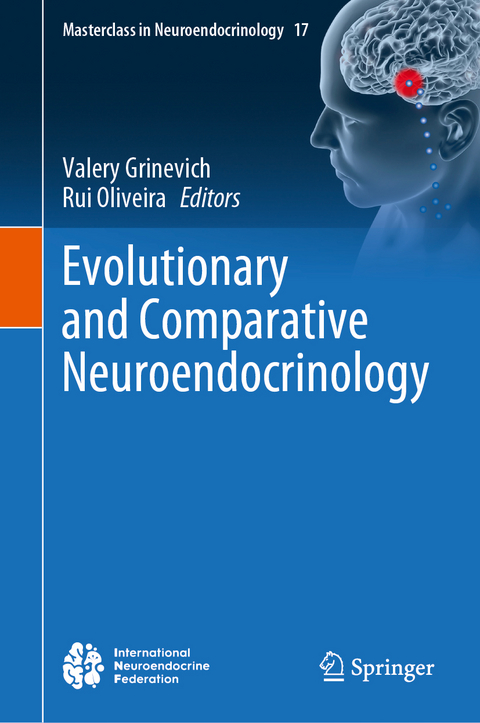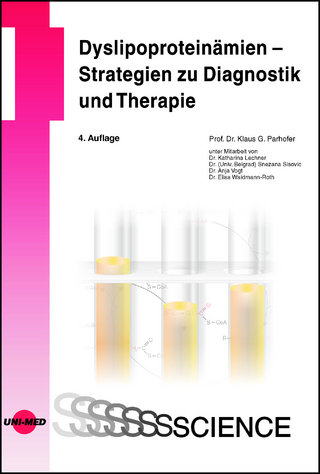
Evolutionary and Comparative Neuroendocrinology
Springer International Publishing (Verlag)
978-3-031-80208-9 (ISBN)
- Noch nicht erschienen - erscheint am 02.03.2025
- Versandkostenfrei
- Auch auf Rechnung
- Artikel merken
This book delves into the intricate journey of neuroendocrine evolution, from its rudimentary origins in single-celled organisms to the complex systems found in mammals. It offers a comprehensive exploration of how neuropeptides and their receptors have evolved, highlighting the pivotal role of the hypothalamus and pituitary gland in this process.
Key concepts covered include the evolution of neuropeptide signaling, insights from invertebrate hypothalamic-pituitary systems, and the functional trajectories of ancient peptide ligand-receptor systems. The book addresses critical questions such as the organization and evolution of neurotransmitter volume transmission, the form and function of growth hormone-releasing hormone across vertebrates, and the co-evolution of neuroendocrine signaling dyads. Chapters on the melanocortin system, corticotropin-releasing hormone, and nonapeptide regulation of social behavior in teleost fish provide a deep dive into specific pathways and their evolutionary significance.
Aimed at researchers and professionals in neuroscience, endocrinology, and evolutionary biology, this text serves as an invaluable resource for anyone interested in the comparative anatomy and physiology of neuroendocrine systems.
This is the seventeenth volume in the International Neuroendocrine Federation (INF) Masterclass in Neuroendocrinology series, which aims to illustrate the highest standards and highlight the latest technologies in basic and clinical research, and aspires to provide inspiration for further exploration into the exciting field of neuroendocrinology.
Prof. Valery Grinevich is known for his studies on neuropeptide signaling in the brain. He obtained his MD degree in 1992 at the Kursk State Medical University (USSR/Russia) with specialization in neurology and psychiatry. His PhD thesis was defended in 1996 on a subject of evolutionary and comparative neuroanatomy of oxytocin and vasopressin systems in vertebrates at the Russian Academy of Sciences in Saint-Petersburg (supervisor: Prof. Andrey L. Polenov). Thereafter, as a winner of Russian President Mr. Boris Yeltsin's award, he did his first postdoc with Profs. Fernand Labrie and George Pelletier in Quebec on hypothalamic mechanisms of the stress response. Next, he joined the team of Greti Aguilera at NIH to work on neuro-immuno-endocrine interactions. In 2001, as an awardee of the Alexandre von Humboldt fellowship, he joined Prof. Gustav Jirikowski's group in Jena for two years, focusing on morphological alterations of human hypothalamic neurons afflicted by various pathologies. In 2003 he was appointed as a Full University Professor at the Moscow State Medical University, but resigned this offer, starting his next postdoc training at the Max Plank Institute for Medical Research Heidelberg with the father of modern neuroscience and neuroendocrinology, Prof. Peter H. Seeburg. In 2008 he established his own group in Seeburg's Department, achieving cell-type specific tagging of OT neurons by viral vectors and deciphered a novel mechanism of neuropeptide signaling in the brain via axonal release. In 2012, as a winner of the Chica and Heinz Schaller Research Foundation Award, he became the Head of an independent Group on Neuropeptides allocated at the German Cancer Research Center (DKFZ) and the University of Heidelberg. From May 1st 2019 he has been promoted for a Full University Professor (W3) position at the University of Heidelberg and a Head of Department of Neuropeptide Research in Psychiatry at the Central Institute of Mental Health. From March 2020, he is Affiliate Professor at the Center for Neuroinflammation at the Neuroscience Institute, Georgia State University, Atlanta, USA. In 2022, Valery Grinevich was awarded by the Synergy ERC and the German-Israel Excellence Research Program (DIP) grants, both of which he is coordinating.
Rui Oliveira is Full Professor and Chair of the Neuroscience and Behavior at ISPA - University Institute for Psychological Social and Life sciences, and Head of the Laboratory for Integrative Behavioral Biology at the Gulbenkian Institute of Science, in Lisbon, Portugal. He obtained his PhD in Biology in 1996 with a study on the neuroendocrinology of social dominance in cichlid fish, and after a post-doc in the laboratory of Prof. Peter McGregor at the University of Nottingham, to study animal communication networks, he became a faculty member at ISPA, where he served as Dean from 2010 to 2020. He is also an active science communicator, having organized a science exhibition about the brain for a general audience ("Brain: wider than the sky", 2019, Calouste Gulbenkian Museum, Lisbon) which attracted over 85,000 visitors, and recorded a Gulbenkian Masterclass video series on the brain. He has also been an active member of the research community, having served in different bodies of several scientific societies (Portuguese Ethological Society, Association for the Study of Animal Behavior, Society for Behavioral Neuroendocrinology), including as President of the Society for Social Neuroscience. His main research interests are focused on the evolutionary neurobiology of social behavior and research agenda is focused in an integrative approach to the study of social behavior, which combines the study of proximate causes (gene modules, hormones, neural circuits, cognitive processes) and ultimate effects (evolutionary consequences). In particular, he aims to understand how brain and behavior can be shaped by the social environment and how the cognitive, neural and genetic mechanisms underl
Part I: General Principles Of Neuropeptide Signaling In Invertebrates And Vertebrates.- Chapter 1: Evolution Of Neuropeptide Signaling: From A Single Cell To Mammals.- Chapter 2: Evolution Of Hypothalamic-Pituitary Neuropeptides And Their Receptors: Insights From Invertebrates.- Chapter 3: Volume Transmission Of Neurotransmitters And Neuropeptides In The Brain.- Chapter 4: The Evolution Of The Pituitary Gland.- Part Ii: Evolution Of The Hypothalamic-Pituitary-Endocrine Gland Axes In Vertebrates.- Chapter 5: Evolution Of The Gnrh Neuron.- Chapter 6: Thyrotropin-Releasing Hormone (Trh)-Containing Neuronal System In The Brain: Organization, Function, And Evolution.- Chapter 7: The Evolution Of Hypothalamic-Pituitary-Thyroid Axis.- Chapter 8: Form And Function Of Growth Hormone Releasing Hormone In Vertebrates.- Chapter 9: Evolution Of The Melanocortin System.- Chapter 10: The Corticotropin-Releasing Hormone - Evolutionary Origins And Functional Trajectories Of An Ancient Peptide Ligand-Receptor System.- Chapter 11: Co-Evolution Of Pacap, Vip And Related Peptides And Their Receptors As Neuroendocrine Signaling Dyads In Vertebrates. Perspectives For Mammalian.- Part Iii: Evolution, Comparative Physiology, And Behavioral Effects Of Neurohypophyseal Peptides In Vertebrates.- Chapter 12: Evolution Of Electrophysiological Properties Of Magnocellular Neurons.- Chapter 13: How Does The Camel Survive In The Desert Without Drinking?.- Chapter 14: The Evolution Of Oxytocin Receptor Signaling.- Chapter 15: Nonapeptide Evolution And The Regulation Of Social Behaviour In Teleost Fish: From Molecules To Sociality.- Chapter 16: Insights And Future Perspectives Of Ot-Like Peptides In Birds.
| Erscheint lt. Verlag | 2.3.2025 |
|---|---|
| Reihe/Serie | Masterclass in Neuroendocrinology |
| Zusatzinfo | VIII, 430 p. 98 illus., 92 illus. in color. |
| Verlagsort | Cham |
| Sprache | englisch |
| Maße | 155 x 235 mm |
| Themenwelt | Medizinische Fachgebiete ► Innere Medizin ► Endokrinologie |
| Medizin / Pharmazie ► Studium | |
| Naturwissenschaften ► Biologie ► Humanbiologie | |
| Schlagworte | comparative anatomy • comparative behaviors • comparative endocrinolgy • GnRH system • GPCR signaling • Hypothalamus • Neuropeptides • Oxytocin • thryotropin • TRH system • Vasopressin |
| ISBN-10 | 3-031-80208-X / 303180208X |
| ISBN-13 | 978-3-031-80208-9 / 9783031802089 |
| Zustand | Neuware |
| Informationen gemäß Produktsicherheitsverordnung (GPSR) | |
| Haben Sie eine Frage zum Produkt? |
aus dem Bereich


